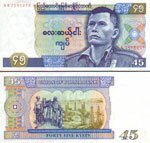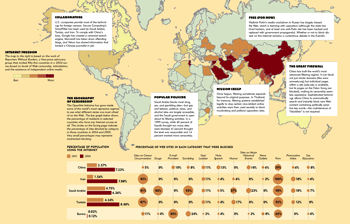Another Avian Flu Blog, H5N1, offers a look at computer modeling of how an epidemic may spread.
Both studies look at Thailand as the example source of an epidemic, in part because the Thai government has been more forthcoming with useful information than China and Vietnam (other locations of known human H5N1 infections), and in part because Thailand remains a hotbed of the virus. The Nature team took a case of a single rural resident of Thailand coming down with a human-transmissible form of H5N1, then calculated the patterns of infection across the nation. The results — visible in this movie (small .mov, larger .ram), with red representing flu cases and green representing locations where the disease has "burned through" the population — are sobering.
H5N1 also links to clips on how the plague could be controlled. Improvements in computer modeling are fantastic. And even if we don’t face Armageddon, a pandemic option would be a great feature for any new Sid Meier game.
I recommend that the man in this photo get out of China as quickly as possible, he won’t be popular after this is transmitted through the SinoBlogosphere:

While it’s not clear if this is the gentleman in question, ESWN reports an Australian named Paul said, "I cannot believe that I would be on top of the Great Wall; and I can’t believe that I can piss a full load right
here."
Pissing on the only man-made object visible from space the Great Wall isn’t going to win you many Chinese friends, although Xinhua is remiss in labeling a rave an orgy. Still, if Binfeng is right the guy who couldn’t hold it may herald a new wave of Great Wall preservation.
On the China blogosphere, we are being watched. Andrea notes an SCMP item on a lecture given by CCTV’s producer Hu Yong.:
"The mainland’s internet police are keeping a wary eye on messages posted by its 5 million bloggers, although most of them use cyberspace as a channel to express their desire for individualism, according to a leading network expert from the mainland."
Chirol at Coming Anarchy takes a quick look at the threat from the nutty nuke-wielding, shorter-than-average guy with a really bad haircut, noting that Clinton cannot be blamed for the current crisis.:
I take a dim view of those on the right who tend to immediately and anachronistically blame him for problems occuring during the present administration. Though the North Koreans indeed renegged on their agreement, it should firstly not come as a surprise nor as unprecendented. The Soviets broke almost every agreement we had with them but it was still better to have some sort of framework than nothing.
Not a surprise indeed, North Korea has not only reneged on any military agreement, it reneges on every agreement! It is a serial violator of trade agreements, even with friendly states such as the former USSR and China, and is a defaulter on its debt. It’s a nasty rogue state and should be forced to stand in the corner until it collapses.
Speaking of Rogue States, good news for Asia, the continent does not feature a single nation in the top-10 of Foreign Policy’’s Failed States index. Plus only three nations cracked the top-20: Afghanistan at 11, North Korea at 13 and Bangladesh at 17. Burma/Myanmar comes in 23rd,
A twisted tale comes from India Uncut, apparently the Congress Party has a problem with press freedom, although they still try to get press coverage when they organize a mob to attack a publication.
The group that came to the first floor roughed up the watchman, broke open the door and charged in shouting on the top of their voices.
This group broke computer keyboards, yanked out phone wires and one of them had even held up a chair to throw at the publisher’s glass cabin.
And here’s the bit I find most remarkable:
Ironically, other press had also arrived at the Mid Day office with the Congress persons, giving the indication that the ruling party had called the media in advance to flaunt their cowardly act.
From Sepia Mutiny, a study that damns public health care.:
Although doctors love to tell you that they work out of a sense of seva, and that the quality of care has little to do with the fee structure, it simply isn’t true. Surprising as it seems, the researchers find that you’re better off with a less trained private doctor than a better trained public doctor. Why? Because the private doctors try harder.
While not strictly Asia related, IndCoup of Indonesia notes an Egyptian report that states that French Kissing and Doggie Style are inventions of Islam. If this is true, I completely forgive the religion for inventing calculus.
After a lawmaker is reported dead after voting against Japan Post privatization, Joi Ito recounts a disturbing conversation with chairman of broadcaster NHK:
I remember him telling me that half of the officially reported suicides were actually political murders/assassinations and that the corruption went all the way to the top. If I had heard this from anyone other than the chairman of the largest broadcaster, life-long political reporter and behind-the scenes kingmaker, I would have thought it was a stupid conspiracy theory
Rajan says that Malaysians who are upset about the haze should SMS Indonesian president SBY. Jeff Ooi has more on the Air Pollutant Index, which was banned for eight years because it damaged tourism.
 The Lost Nomad reports that Mamon is alive and well on the Peninsula.
The Lost Nomad reports that Mamon is alive and well on the Peninsula.
LG Electronics Inc., South Korea’s second-largest consumer electronics manufacturer, said Monday it has begun selling a new three-door refrigerator encrusted with about 4,900 crystals from Austria’s renowned crystal maker Swarovski.
Only 200 of the refrigerators, which are available in South Korea for 3.99 million won (US$3,934), will be sold, LG said in a statement.
I hate it when this happens. In Singapore, quite possibly the only first-world country that (embarrassingly) isn’t a democracy, the ruling People’s Action Party is again acting like Iran’s Guardian Council. Why? A challenger may emerge in the presidential election:
But not in Singapore though. Like in Ayatollah-ruled Iran, interested candidates must first be prequalified by unelected guardians of the faith (the PAP faith in Singapore’s case). Only safe candidates can be presented to voters.
In the Philippines, Sassy says pork-barrel politics must end.:
There’s this lawyers’ group called Lawyers against Monopoly and Poverty (LAMP) that filed a petition with the Supreme Court to declare as unconstitutional the appropriation of the Priority Development Assistance Fund, otherwise known as pork barrel funds–PhP 65 million for each member of the Lower House and PhP 200 for every senator, annually. The total is PhP 8.23 billion.
Why unconstitutional? Because the job of the Legislature is to legislate. The job of developing the countrysides, including infrastructure projects, properly belongs to the executive branch. The Constitution says that the three branches of government–executive, legislative and judiciary–shall be co-equal but separate. Therefore, if one branch encroaches upon the functions of another, there is a violation of the Constitution. Furthermore, the pork barrel funds “pet projects” of legislators and are a source of corruption.
Indeed, if Gloria is ousted, there should be a Sassy for President campaign.
 Ne Win was perhaps a bit of both. He was a famously reclusive leader, known for his foul mouth, many marriages and obsessive superstition. It was his dabblings with numerology that had the most dramatic consequences for Burma. In 1987 Ne Win demonetized certain banknotes, replacing them with new notes with denominations of 45 kyat and 90 kyat – each value neatly divisible by nine (an astrologically auspicious number, and the general’s favourite). People’s already paltry savings were wiped out overnight and, with little to lose, a year later they took to the streets in the 1988 uprising.
Ne Win was perhaps a bit of both. He was a famously reclusive leader, known for his foul mouth, many marriages and obsessive superstition. It was his dabblings with numerology that had the most dramatic consequences for Burma. In 1987 Ne Win demonetized certain banknotes, replacing them with new notes with denominations of 45 kyat and 90 kyat – each value neatly divisible by nine (an astrologically auspicious number, and the general’s favourite). People’s already paltry savings were wiped out overnight and, with little to lose, a year later they took to the streets in the 1988 uprising.








































